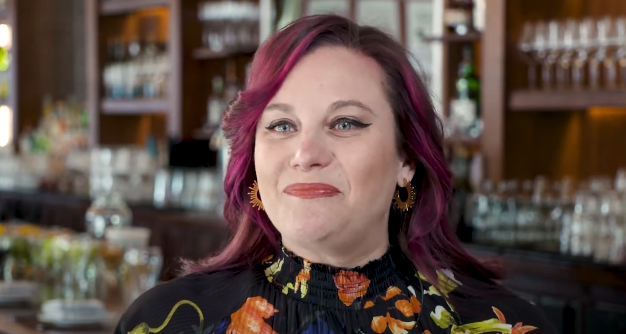It began as a gradual change modest dietary adjustments, minor alterations to daily routines, and quiet times of introspection in the garden. However, Karen Akunowicz’s deliberate choices eventually led to something much bigger than pounds lost or inches lost. Her metamorphosis was remarkably symbolic a tale of not only physical change but also regaining equilibrium for someone whose identity has long been associated with strong flavors and decadent Italian cuisine.
Karen’s journey to lose weight happened gradually but deliberately. She didn’t follow a fad supplement or go on a crash diet. She gradually changed the direction of her wellness regimen by concentrating on healthy eating, portion control, and exercise. She increased her strength and endurance by walking more and doing powerlifting on a regular basis. Yoga added the kind of flexibility that extended far beyond muscle fibers, and gardening turned into a form of meditation.
| Attribute | Details |
|---|---|
| Full Name | Karen Akunowicz |
| Date of Birth | September 17, 1978 |
| Profession | Chef, Restaurateur, Television Personality |
| Notable Restaurants | Fox & the Knife, Bar Volpe (Boston) |
| TV Appearances | Top Chef, Tournament of Champions |
| Weight Loss Milestone | Lost over 65 pounds gradually |
| Fitness Routine | Powerlifting, Walking, Yoga |
| Diet Focus | Clean Eating, Portion Control, Meal Prepping |
| Mental Health Practices | Telehealth Therapy, Gardening, Time Outdoors |
| Source | Best Ketofitlife |
The sustainability of Karen’s transformation, rather than just the extent of it, is what makes her story so compelling. Quick fixes like miracle injections, unsupervised fasting, and celebrity-endorsed detox programs have become more and more prominent in discussions about weight loss in recent months. But Karen’s path takes a welcome detour. With the help of self-awareness, structure, and intention, she gradually achieved her goals.

She changed accountability from a punishment to a motivator by using a straightforward app to track her progress. The notion that change is gradual and arises from the quiet discipline of daily choices was reaffirmed with each meal or walk that was tracked. Her choice to put mental health first, particularly by communicating with therapists virtually, significantly increased her emotional fortitude. And she acknowledges that having that emotional fortitude was equally as crucial as gaining muscle or losing weight.
In recent years, Chef Akunowicz has changed her lifestyle, but she is not the only one. This trend toward intentional living has been reflected in public figures from the culinary and entertainment sectors. Another well-known chef, David Chang, has openly discussed his struggles with mental health. In her memoir, Chrissy Metz prioritized wellness over weight loss. By sticking to boxing and clean eating, even Action Bronson, the tattooed foodie turned fitness enthusiast, lost more than 125 pounds. In that regard, Karen’s story aligns with a larger cultural movement that prioritizes long-term health over ephemeral beauty.
Women in the hospitality industry, particularly those in charge of high-pressure kitchens, frequently face an unrelenting pressure to perform, care for, and produce. Karen’s decision to take a break and focus on her own health sends a particularly strong message to other professionals in the field. She is changing workplace culture from the inside out by allowing her restaurant employees to practice yoga and riding their bikes to work. Her leadership exemplifies a trend that is gradually gaining traction: that self-care need not be sacrificed for success.
Particularly moving is the symbolism of Karen caring for her garden while fostering her well-being. Many people can relate to this metaphor. Wellness requires the proper environment to flourish, such as time, patience, and room. Her sunny, peaceful yard provides more than just cooking herbs; it’s a haven where insight blossoms. These times of isolation were incredibly healing and provided her with the mental capacity to maintain her new lifestyle.
Karen fought perfectionism all along the way. She didn’t shame herself for making slow progress or condemn infrequent indulgences. Rather, she celebrated little victories, such as a prepared lunchbox or a heavier deadlift, each of which demonstrated that health is more than just reaching the finish line. It’s about being there for yourself, consistently and with kindness.
Her passion for powerlifting also has a very empowering quality. The image of a woman lifting weights redefines what strength can look like in her world, as she is frequently spotted plating delicate pasta or arranging soft herbs. Karen’s embrace of muscular power is remarkably liberating in an era where women are frequently expected to be either delicate or disciplined.
Her metamorphosis reflects a current cultural shift in which wellness particularly for women over 40 is no longer a taboo subject but rather a celebrated theme. It’s about extending lives, not just about bodies getting smaller. Through intentional abundance rather than a lens of limitation, Karen’s story inspires others to reconsider what is possible.
She is demonstrating a significantly better framework for contemporary self-care by placing equal emphasis on mental and physical wellness. There are no short cuts in her story. It demonstrates what is possible when strength is developed rather than demanded and progress is fostered rather than hurried.
This mindset is reflected in her social media presence as well. Karen posts real-life glimpses of her days, such as bike rides, kiddie pool lounging, and updates on her vegetable garden, instead of glitzy photos or product placements. These endorsements aren’t staged. These brief but impactful moments give others the opportunity to pause, think, and perhaps sow the seeds of change themselves.
